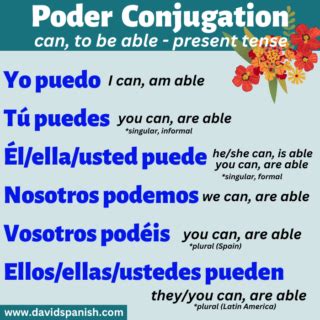Introduction to Poder Conjugation in the Preterite Tense

The Spanish verb “poder” is a vital component of the language, translating to “to be able to” or “can” in English. Mastering its conjugation is essential for expressing ability, permission, or possibility in the past. The preterite tense, which is used to describe completed actions in the past, is a fundamental aspect of Spanish grammar. In this article, we will delve into the conjugation of “poder” in the preterite tense, exploring its various forms, usage, and providing examples to facilitate understanding.
Key Points
- The verb "poder" is irregular in the preterite tense, requiring memorization of its conjugation.
- The preterite conjugation of "poder" is used to express past ability or possibility.
- Understanding the conjugation of "poder" in the preterite tense is crucial for effective communication in Spanish.
- Practice with examples and exercises is essential for mastering the preterite conjugation of "poder".
- Contextual understanding of when to use the preterite versus other past tenses, like the imperfect, is vital for accurate expression.
Poder Conjugation in the Preterite Tense

The preterite conjugation of “poder” is as follows:
| Subject | Conjugation |
|---|---|
| Yo | Pude |
| Tú | Pudiste |
| Él/Ella/Usted | Pudo |
| Nosotros/Nosotras | Pudimos |
| Vosotros/Vosotras | Pudisteis |
| Ellos/Ellas/Ustedes | Pudieron |

As shown, the conjugation of “poder” in the preterite tense is irregular and must be memorized. Each subject pronoun has a unique conjugation that indicates the ability or possibility in the past.
Usage and Examples
The preterite conjugation of “poder” is used to express actions or states of being that occurred at a specific point in the past and are now completed. For example:
Pude hablar con él ayer porque estaba en la ciudad. (I was able to speak with him yesterday because he was in the city.)
Ella pudo terminar su proyecto a tiempo gracias a su dedicación. (She was able to finish her project on time thanks to her dedication.)
These examples illustrate how the preterite conjugation of “poder” is used to express past ability or possibility, highlighting the importance of mastering its conjugation for effective communication in Spanish.
Practical Applications and Nuances
Beyond its basic usage, understanding the nuances of “poder” in the preterite tense can significantly enhance one’s ability to express complex ideas. For instance, the distinction between “poder” and other verbs of ability, or the use of “poder” in conditional sentences, requires a deep understanding of Spanish grammar and syntax.
Moreover, the preterite conjugation of “poder” can be used in combination with other tenses to express a wide range of past scenarios, such as abilities that were present in the past but are no longer, or possibilities that existed but did not materialize.
Conclusion and Future Directions
In conclusion, the conjugation of “poder” in the preterite tense is a vital aspect of Spanish grammar that enables speakers to express past ability or possibility with precision. By mastering its irregular conjugation and understanding its usage through examples and practical applications, learners can significantly enhance their communicative abilities in Spanish.
For those seeking to further their knowledge, exploring the nuances of “poder” in other tenses, such as the imperfect or the conditional, can provide a deeper understanding of Spanish grammar and syntax, ultimately leading to more effective and expressive communication.
What is the difference between the preterite and imperfect tenses when using “poder”?
+The preterite tense is used for completed actions in the past, while the imperfect tense describes ongoing or repeated actions. For “poder”, the preterite would be used to express a specific instance of ability (e.g., “Pude”), whereas the imperfect would describe a general or ongoing state of ability (e.g., “Podía”).
How does the conjugation of “poder” in the preterite tense differ from its conjugation in the present tense?
+The conjugation of “poder” in the preterite tense is irregular and differs significantly from its present tense conjugation. In the present tense, “poder” follows a regular -er verb pattern for the most part, whereas in the preterite, each subject pronoun has a unique and irregular form that must be memorized.
Can “poder” be used in the preterite tense to express future possibilities that did not occur?
+Yes, “poder” in the preterite tense can be used to express past possibilities that did not occur, often in conjunction with other verbs or in conditional sentences. For example, “Pude haber ido” means “I could have gone”, indicating a past possibility that did not materialize.
